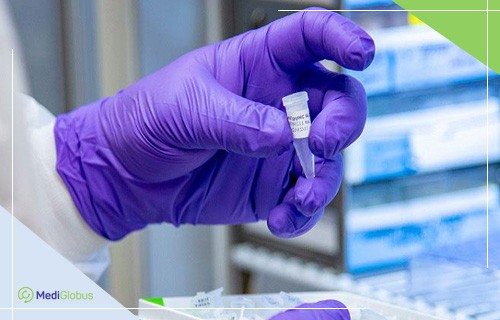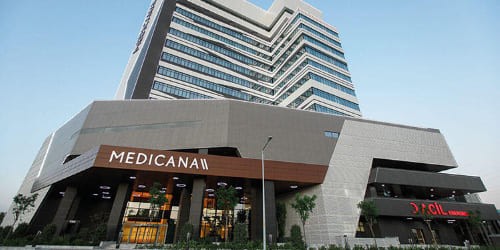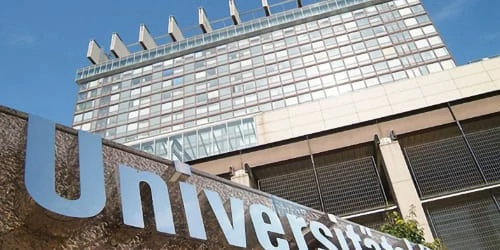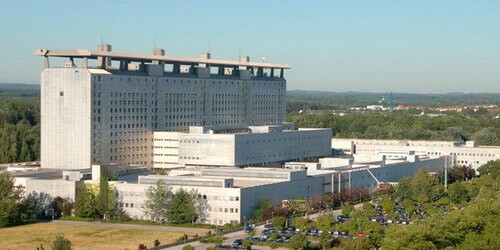1. How does immunotherapy work? |
2. Indications for treatment |
3. Paediatric immunotherapy |
4. Comparison of different methods |
5. Side effects |
6. The cost of treatment |
7. Leading clinics |
Immunotherapy involves activating the body’s immune forces to fight cancer. It helps the immune system to find cancer cells and destroy them with the help of T-lymphocytes. Every year the number of cancers that are successfully treated with this method is steadily increasing. Find out which malignant tumours respond to immune medication and how effective this treatment is in our article.
Listen to the article:
How is immunotherapy carried out?
Immunotherapy involves using immune cells to destroy a malignant tumour. It “trains” the patient’s immune system to fight the cancer.
More than 70 immunological preparations are available abroad, in comparison to 20 on average in developing countries. About 10 new drugs are registered every year in Europe and the USA.
Immunotherapy treatment of cancer involves injecting a biologically active antitumour drug into the patient. It is selected for each person individually. The immunogenetic analysis of the tumour cells is taken into account.

The main types of immunotherapy used to treat cancer include:
monoclonal antibodies,
checkpoint inhibitors,
anti-cancer vaccines.
The medicine is prescribed as tablets or injections. It can be taken at home, only requiring regular consultations with the doctor. The duration of immune therapy depends on the type of cancer and how advanced it is. As a rule, 2-6 months is sufficient to achieve maximum therapeutic effect. In some cases, long-term treatment of about a year or longer is needed.
In the early stages of the disease, immunotherapy prevents the tumour from metastasising, and in the later stages, it halts its growth. It increases the effectiveness of treatment by 60-80%.
Biotherapy is available in all cancer centres in developed countries. It is carried out in full compliance with international protocols. To go for immune-based cancer treatment, please contact the medical coordinators of MediGlobus International Medical Platform.
Indications
Immune therapy is indicated for many cancers. It is currently prescribed for 15 different stages of cancer. The most common indications are:
melanoma,
prostate cancer,
lymphoma,
glioma,
gastric oncology,
neuroblastoma,
breast tumours,
leukaemia,
Hodgkin’s lymphoma,
pancreatic cancer.
Immunotherapy for melanoma

Melanoma is one of the most aggressive malignant skin tumours. It responds poorly to chemotherapy but gives a good response to immune drugs, especially Keytruda.
Immunotherapy is indicated for controlling the recurrence of melanoma, as well as for metastatic and inoperable neoplasms. It can be used alone or in combination with surgery or radiation.
In severe cases, several drugs are used simultaneously. If the tumour cannot be completely removed by surgery, immunological drugs are injected directly into the pathological focus.
Keytruda has demonstrated good results in the treatment of melanoma. It is approved by the FDA. After its administration, 67% of patients experience a significant improvement in their condition. 6% of patients achieve persistent remission. The effectiveness of oncotherapy with Keytruda is five times higher than conventional chemotherapy.
Immunotherapy for brain tumours
This method is effective against gliomas, neuroblastomas, glioblastomas and other malignant brain tumours. It increases the effectiveness of treatment of these tumours by 20-30%. That prolongs the life expectancy of patients with stage 3-4 brain cancer for years.
Abroad, dendritic cells or “anti-cancer vaccine” are administered for brain tumours. This is the use of special immune system cells that help to recognise the neoplasm.
The dendritic cells are obtained from the patient’s blood. They are processed in a laboratory and “trained” to distinguish healthy tissue from cancerous tissue. The vaccine is then injected into the patient. This makes the tumour visible to the body’s natural defences.
Immunotherapy is effective in treating malignant brain tumours that do not respond to chemotherapy or radiotherapy. For example, the 5-year survival rate of patients with glioblastoma has increased from 5% to 20% when using immunotherapy.

Immunotherapy for gastric cancer
There are currently two FDA-approved biotherapy options for this type of cancer. These include checkpoint inhibitors and monoclonal antibodies.
Checkpoint inhibitors are drugs that turn off the ‘blocks’ of the immune system that slow it down. These ‘blocks’ help the tumour to go undetected. By removing them, the immune system can actively fight against malignant cells. Checkpoint inhibitors are prescribed for advanced gastric cancer. The drugs include Keytruda and Opdivo.
Monoclonal antibodies are ‘artificial analogues’ of the immune system that help to find specific targets on the surface of the tumour and target them. These drugs are used at stage 4 of gastric cancer. They help to increase life expectancy and quality of life. Herceptin is one such medicine.
After immune therapy, partial regression of the gastric tumour in the advanced stage is seen in 55% of patients. In 1,4% of patients, the malignancy disappears completely.
Immunotherapy for leukaemia
The use of immunotherapy has been a breakthrough in the treatment of patients with blood cancers, especially acute lymphatic leukaemia. Monoclonal antibodies are used to fight this type of cancer.

The drugs are usually administered intravenously for one month. If necessary, the course is repeated after 2 weeks. The patient’s condition is closely monitored by medical staff.
The results of immunotherapy for patients with acute lymphoblastic leukaemia who have not responded to any of the treatments are as follows:
94% of cancer patients had a significant improvement in their general condition,
50% of patients stopped the growth of the tumour,
80% of patients have reduced symptoms.
Immunotherapy for Hodgkin’s Lymphoma
Classical Hodgkin’s lymphoma is usually curable. However, in 20-30% of patients, oncotherapy fails. They will relapse or progress despite intensive treatment. Biotherapy gives such patients a chance. This method has shown promising results in the advanced stages of the disease. A long-term remission or stabilisation of the disease has been observed in 60% of patients.
Immunotherapy for Hodgkin’s lymphoma offers many treatment options for both adults and children. There are currently 10 FDA-approved treatments. According to a Northwestern Medicine clinical trial, a brief course of immunotherapy leads to complete remission in 64% of previously untreated patients with classic Hodgkin’s lymphoma.
Immunotherapy for breast cancer
Immunotherapy can be used to treat metastatic breast cancer. The Food and Drug Administration (FDA) has approved 2 drugs for this purpose – Keytruda and Tecentric. Both are immune checkpoint inhibitors. They are combined with chemotherapy for maximum effectiveness, which exceeds 80%.
Immunotherapy for prostate cancer
A vaccine called sipuleucel-T (Provenge) is used for prostate cancer. It encourages the patient’s immune system to attack the cancer cells. The vaccine is recommended for the treatment of advanced tumours. It is created for each patient individually. The material is extracted from the patient’s blood and cultured in the laboratory. The vaccine is administered intravenously three times at 2-week intervals.
Is immunotherapy used to treat cancer in children?
Biotherapy is among the key treatment options for some types of cancer in children, for example:
leukaemia,
rhabdomyosarcoma,
neuroblastoma,
glioblastoma,
osteosarcoma,
lymphoma.
This method is also called biological therapy. Its drugs do not suppress the body’s functions. They are non-toxic and well-tolerated by patients.
Immunotherapy, chemotherapy and targeted therapy – what is the difference?

Immunotherapy, chemotherapy and targeted therapies are actively used to treat cancer in adults and children. Each of these methods has its differences. Immunotherapy is characterised by long-lasting effects. This means that after a course of treatment, cells are produced in the patient’s blood that continue to fight the cancer. Chemical and targeted therapies do not have this effect. If all the cancer cells are not destroyed, a relapse will occur.
Chemo has a negative effect not only on the malignant tumour but also on all rapidly dividing cells in the body. In immune and targeted therapies, healthy organs and systems are not affected. These methods involve targeting the tumour. However, they differ in their mechanism of action.
Targeted drugs recognize certain proteins in the tumour and attack them, while immune therapies try to stimulate the body’s natural powers to recognize and destroy the pathological focus.
What are the side effects of cancer treatment with immunotherapy?
The treatment of cancer with immunotherapy very rarely causes complications. There are no serious side effects in 97% of cases. In some patients, long-term treatment with immunotherapy causes the following negative effects:
allergic reactions (rashes and itching),
decreased blood pressure,
loss of appetite,
increased fatigue and sleepiness,
inflammation of mucous membranes,
nausea.
If any complications occur, the treating doctor will make adjustments to the treatment programme. He or she will prescribe a different drug or add medication that eliminates the side effects.
Price of immunotherapy abroad
| Country | Cost |
|---|---|
| Turkey | from $4,000 |
| Israel | from $8,000 |
| Germany | from €9,000 |
| Country | Cost |
|---|---|
| Spain | from €8,000 |
| South Korea | from $6,000 |
| Austria | from €9,000 |
Where is immunotherapy available abroad?
According to MediGlobus patient reviews, the best places to receive biotherapy are Turkish, Israeli, German, Austrian and Korean clinics. The following hospitals are particularly popular among medical tourists:
Summary
Immunotherapy is an innovative approach to fighting cancer. It harnesses the power of the patient’s immune system to detect and destroy malignant cells. The technique is being clinically tested for almost all types of malignancies. The number of cancers successfully treated with such drugs is increasing every year.
The cost of biotherapy abroad depends on the type of cancer and the characteristics of the tumour. The price is also influenced by the level of the medical centre. The cost abroad starts at $4,000.
Medical tourists most often come for bio-therapy to Germany, Israel, Turkey, Spain and Korea. Leading clinics in this destination include Liv Vadistanbul, Medicana, Hadassah, Assuta, Asan, SoonChunHyang, Teknon, and university clinics in Cologne, Navarra and Munich.
To make an appointment for cancer immunotherapy abroad, click on the button below and leave your contact details. MediGlobus coordinators will contact you as soon as possible and help you with medical travel arrangements.
















